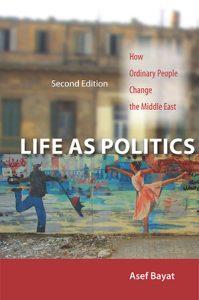Life as Politics: How Ordinary People Change the Middle East

Author: Asef Bayat
Publisher: Stanford University Press
Year of Publication: 2013 (Second Edition)
Print Length: 392 pages
Genre: Non-Fiction / Anthropology, Sociology, Political Science
Area: Middle East
Topic: Activism, Community, Solidarity, Arab Spring, Everyday Life, Politics & Power, Change, Culture & Society, Repression, Resistance; Self-Determination, Autonomy, Agency; Social Network, Social Justice, Social Movement, Social Impact, Poverty, Fun & Entertainment, Youth & Youthhood, Feminism, City & Urban, Ecology & Climate, Islam, Global Radicalism, Cosmopolitanism, Revolution, Democracy
Prior to 2011, popular imagination perceived the Muslim Middle East as unchanging and unchangeable, frozen in its own traditions and history. In Life as Politics, Asef Bayat argues that such presumptions fail to recognize the routine, yet important, ways in which ordinary people make meaningful change through everyday actions. First published just months before the Arab Spring swept across the region, this timely and prophetic book sheds light on the ongoing acts of protest, practice, and direct daily action.
The second edition includes three new chapters on the Arab Spring and Iran’s Green Movement and is fully updated to reflect recent events. At heart, the book remains a study of agency in times of constraint. In addition to ongoing protests, millions of people across the Middle East are effecting transformation through the discovery and creation of new social spaces within which to make their claims heard. This eye-opening book makes an important contribution to global debates over the meaning of social movements and the dynamics of social change.
Table of Contents
Preface
Acknowledgments
1. The Art of Presence
PART 1: SOCIAL NONMOVEMENTS
2. The Quiet Encroachment of the Ordinary
3. The Poor and the Perpetual Pursuit of Life Chances
4. Feminism of Everyday Life
5. Reclaiming Youthfulness
PART 2: STREET POLITICS AND THE POLITICAL STREET
7. Battlefield Tehran
8. Streets of Revolution
9. Does Radical Islam Have an Urban Ecology?
10. Everyday Cosmopolitanism
11. The “Arab Street”
PART 3: REVOLUTIONS
12. Is There a Future for Islamic Revolutions?
13. The Post-Islamist Refo-lutions
14. The Green Revolt
15. The Coming of a Post-Islamist Democracy
Notes
Index

Asef Bayat is Professor of Sociology, and the Catherine and Bruce Bastian Professor of Global and Transnational Studies at the Department of Sociology, University of Illinois, Urbana-Champaign. Before joining Illinois, Bayat taught at the American University in Cairo for many years, and served as the director of the International Institute for the Study of Islam in the Modern World (ISIM) holding the Chair of Society and Culture of the Modern Middle East at Leiden University, The Netherlands. In the meantime, he had visiting positions at the Universality of California, Berkeley, Colombia University, Oxford, and Brown. His research interests focus on social movements and social-political change; religion and public life; urban life and politics; Islam and modernity; Contemporary Middle East.
Source: https://sociology.illinois.edu/directory/profile/abayat
More from Asef Bayat in this library, click here.
